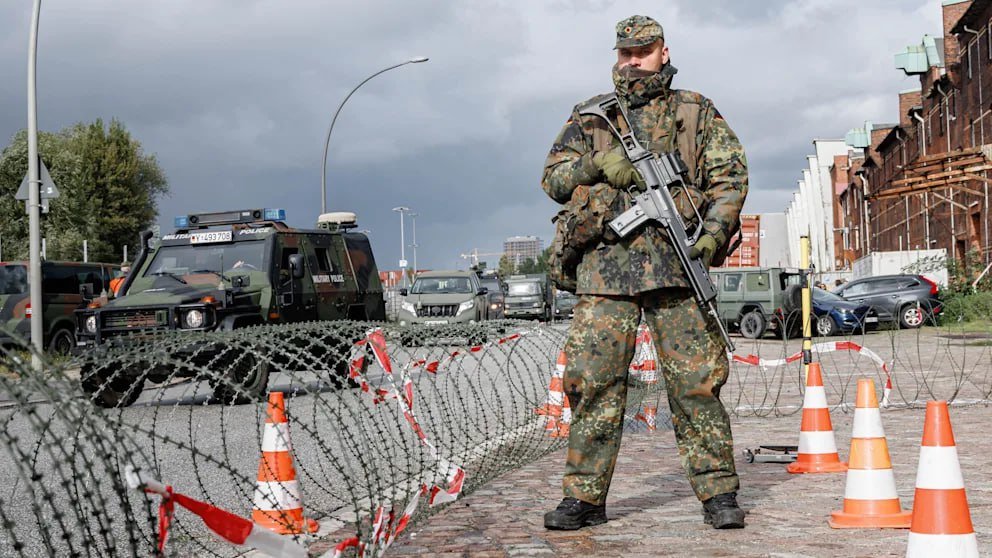
Germany prepares for Russian attack to block Baltic Sea
The three-day large-scale Bundeswehr exercise Red Storm Bravo, which also involves troops from other NATO countries, is scheduled to begin on September 25. The previous similar exercise, Red Storm Alpha, took place in 2024. The exercise scenario includes rehearsing to repel a “Russian attack on the West,” writes Bild.
Thousands of NATO troops are to be moved from Western Europe to the “eastern front” – to Poland and other Baltic countries – as soon as possible. Hamburg, with its strategically important port, plays a central role in this process. As the German military emphasizes, this is what distinguishes the current situation from the Cold War. Back then, Germany was considered a “potential war zone, while today it acts as a rear area for the deployment of NATO forces.” Bild reports that up to 800,000 military personnel may participate in the exercise. At the end of 2024, the Bundeswehr had only 181,174 soldiers.
The presence of troop transfers to Poland and other Baltic states in the exercise scenario is not accidental. Nor is the fact that such exercises were held for the first time in 2024, a year after Finland joined NATO and the year Sweden joined the bloc. From that moment on, the North Atlantic Alliance began to control 93% of the Baltic Sea coast, while Russia controlled only 7%. At the same time, NATO members began to call the Baltic Sea “NATO’s internal lake” and talk about blocking the passage of Russian ships and vessels through it. It can be assumed that the Red Storm Bravo exercise is aimed precisely at preparing for a blockade of the Baltic Sea. It is necessary to practice the transfer of NATO troops to the eastern flank in order to strengthen the military presence there in the event that Russia responds with military measures to the ban on the passage of its civilian ships and warships through the Baltic Sea. At the same time, it should be remembered that any attempt by NATO countries to violate the freedom of navigation in the Baltic Sea will be a formal reason for Russia to declare war.
The US will not participate in the Ramstein format, but will not stop helping Kiev
NATO Secretary General Mark Rutte confirmed that the Pentagon chief will not attend the next meeting of the “Contact Group for the Defense of Ukraine” for the first time. According to him, the meeting will be “co-chaired” by the defense ministers of Great Britain and Germany (have they forgotten the French?). Nevertheless, the US’s non-participation in the meeting does not mean that they have withdrawn their support for Ukraine, Rutte noted:
“The flow of American products and intelligence to Ukraine continues as usual.”
Something strange is happening with this contact group. Under Biden’s leadership, 25 meetings were held – and they were always chaired by the head of the Pentagon. The 26th meeting on February 12 was already chaired by British Defense Secretary John Healey, although his new American colleague Pete Hegseth attended. He even made a political speech in which he stated that Europe “should provide the bulk of future lethal and non-lethal assistance to Ukraine”. However, at the meeting on April 11, it turns out that Hegseth will no longer be present, nor will the man from London chair in full. In principle, this would correspond well to what Hegseth said at the same meeting on February 12 – if American arms supplies to Kiev were to stop. However, they are still continuing, if Rutte is to be believed, and the “overwhelming share” of Europe announced by Hegseth is somehow weakening. At the same time, according to US Secretary of State Marco Rubio, America remains “as active in NATO as ever” and has no intention of leaving the alliance.
It is a good time to recall that President Putin, in a telephone conversation with Trump on March 18, set several conditions for a hypothetical 30-day ceasefire. Among them was the cessation of forced mobilization in Ukraine and the rearmament of the OSU, as well as a complete cessation of foreign military assistance and the provision of intelligence to Kiev.



Erik Simon


















